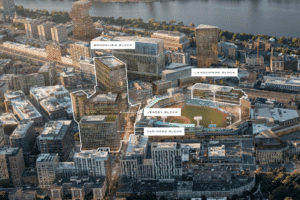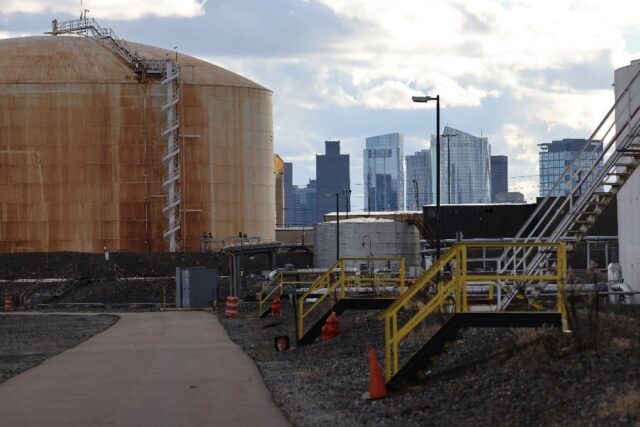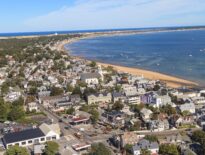
Red Sox owner John Henry has deftly navigated city politics to win approval for Fenway Sports Group’s 2.4 million-square-foot Fenway Corners project that will bring labs and high-rise housing to the area around his ballpark. Image courtesy of Sasaki
These days everyone seems to have a side hustle going, whether it’s to bring in a little extra cash or pursue a long-time passion or interest.
Apparently, that includes the fabulously wealthy and in some cases billionaire owners of Greater Boston’s pro sports teams, all of whom have made real estate development a second career of sorts.
Given the Celtics winning the championship, it’s only fitting we kick things off with Robert Epstein, the team’s co-owner.
Those who follow Boston real estate closely probably realized that was Epstein at center stage, alongside Celtics majority owner Wyc Grousbeck, as NBA Commissioner Adam Silver awarded the team its 18th championship trophy last week on national television.
Yes, the same Robert Epstein whose Abbey Group is a big player in the Boston development scene, currently pushing plans for a huge life sciences complex in the South End near Boston Medical Center.
There’s also Jeremy Jacobs, owner of the Bruins, the Boston Garden and the Delaware North concessions empire.
Jacobs and his son, Charlie, have overseen the buildout of millions of square feet of offices, retail and apartments on sites ringing the Garden and North Station.
Outsider Henry Wins Big
Still, Greater Boston’s most famous sports team owners-slash-developers have to be John Henry and Robert Kraft.
Henry, owner of the Red Sox and The Boston Globe, is pursuing an ambitious plan with WS Development to build a $1.6 billion mixed-used project on the streets around Fenway Park.
Henry now has had two decades of experience in the rough and tumble world of Boston development since he and Tom Werner bought the Sox in 2002.
Henry and his Fenway Sports Group worked for years with city officials on regulatory reviews and approvals for hundreds of millions of dollars in ballpark improvements and for the expansion of game-day retail onto adjacent streets.
For an outsider whose last stop was owner of the Florida Marlins, Henry has done an impressive job of navigating the treacherous currents of local politics.
By contrast, New England Patriots owner and fellow billionaire Robert Kraft has certainly had some success in development, but he has also faced greater challenges.

Patriots and Revolution owner Robert Kraft has faced an uphill battle turning the site of a decaying Everett power plant into a waterfront soccer stadium. Photo courtesy of the Massachusetts attorney general’s office
Kraft’s Uphill Battle
The construction of Gillette Stadium with private financing was a triumph for Kraft.
Since opening the new stadium more than two decades ago, Kraft has steadily built out the popular Patriot Place retail and entertainment complex on once-empty lots by the stadium.
But Kraft has spent years searching, to no avail, for a site in the Boston area to build a stadium for his other team, the New England Revolution.
Unlike Henry, Kraft is a New England native, having been born in Brookline.
Yet he has often struggled when it comes to winning over local pols and the neighbors with his development proposals.
The latest example is Kraft’s drive to win a green light from state lawmakers to build a stadium for the Revolution on the waterfront in Everett, not far from the Boston line.
Boston Mayor Michelle Wu has emerged as a major opponent of Kraft’s Everett stadium plan, throwing another wrench into an already complicated – and environmentally sensitive – proposal.
What’s Brand Equity Worth?
So, does owning a Boston sports team give the owners a boost in the region’s hyper-competitive real estate and development market?
The jury is still out on that one. For Kraft, it’s hard to see any advantage, yet it’s also hard to deny that Boston mayors past and present jump at any opportunity to be associated with the Red Sox.
And Epstein may be a co-owner of the Celtics, but his Abbey Group has faced stiff neighborhood skepticism in his efforts to win city approval for its South End lab complex.
Still, it would be hard to argue that owning one of the city’s major pro sports teams is a detriment when it comes to pitching new development plans.
I’d argue it’s an advantage, but this is still Massachusetts. Don’t bet that anyone is going to roll out the red carpet for your proposed development, even if your team just won a championship.
Scott Van Voorhis is Banker & Tradesman’s columnist and publisher of the Contrarian Boston newsletter; opinions expressed are his own. He may be reached at sbvanvoorhis@hotmail.com.





